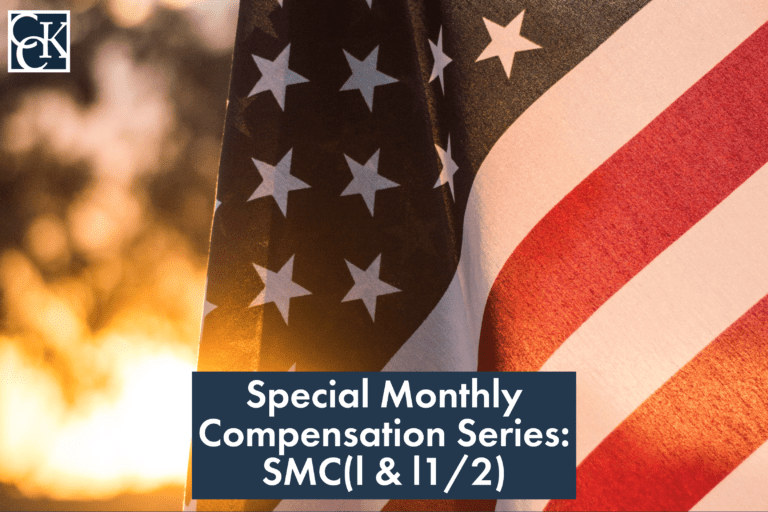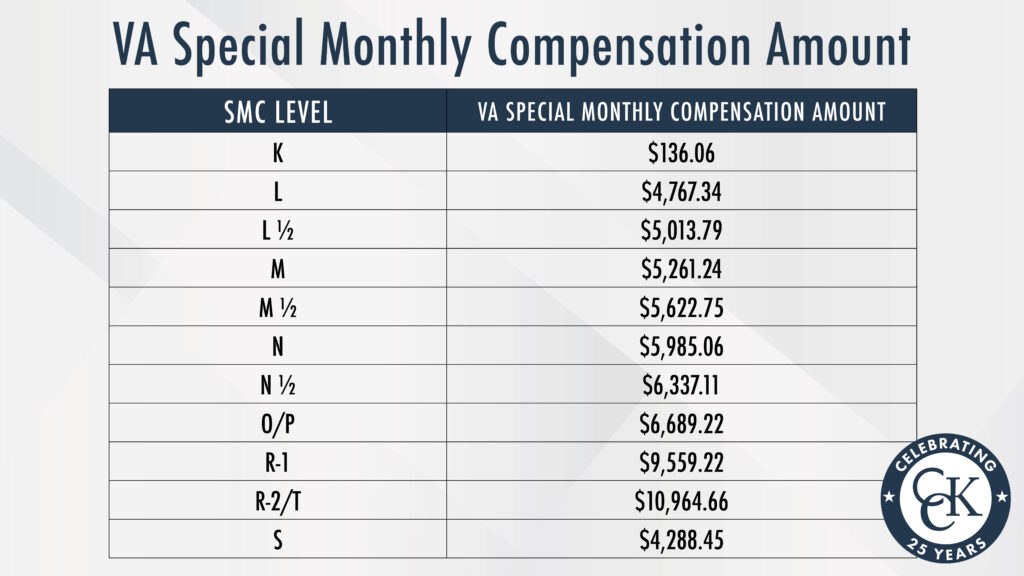VA Special Monthly Compensation L & L1/2: Requirements and Benefits

CCK Law: Our Vital Role in Veterans Law
Special Monthly Compensation level L, or SMC(l), is a type of Veterans Affairs benefit. VA pays Special Monthly Compensation (SMC) to veterans with certain especially serious disabilities or combinations of disabilities. This article will provide our updated insights specifically about SMC level L.
VA may assign SMC(l) status to a veteran if any of these situations are true:
- The veteran has had both feet amputated, or
- The veteran has had one foot amputated, and have lost the use of the other foot, or
- The veteran has had one hand and one foot amputated, or
- The veteran has had one foot amputated, and have lost the use of one hand, or
- The veteran has had one hand amputated, and have lost the use of one foot
Or:
- The veteran has lost the use of both feet, or
- The veteran has lost the use of one hand and one foot
Or:
- The veteran has lost sight in both eyes (blindness), or
- The veteran is permanently bedridden, or
- The veteran needs daily help with basic needs (like eating, dressing, and bathing)
In the rest of this article, CCK Law will discuss the requirements and benefits for SMC(l) in more detail. Learn about other levels of SMC here.

VA SMC-L Requirements
Aid & Attendance (A&A)
Before discussing SMC(l) requirements, it is useful to understand the VA concept of “aid and attendance,” or A&A. If a veteran requires A&A, it means that he or she requires regular assistance from another person. SMC(l) is best-known as the first level of SMC benefits for Aid & Attendance. Unlike some other sources of Aid & Attendance, SMC(l) does not require the assisting person to be a medical professional, and the aid does not have to constant (just regular).
Some examples of situations requiring Aid & Attendance are:
- The inability to dress oneself
- The inability to keep oneself clean and presentable
- Frequent need to adjust a prosthetic device(s), which cannot be done without aid
- The inability to feed oneself
- The inability to go to the bathroom alone
- Requiring care and assistance to protect the veteran from dangers in their daily environment.
The veteran does not need to require all of these forms of assistance to be eligible for A&A.
SMC(l)
Special Monthly Compensation level L encompasses a specific group of service-connected conditions that would qualify a veteran for SMC. Each letter and a “½” increase represents an increased severity of the service-connected condition(s) and symptoms. The rate of compensation for a single veteran without dependents at the SMC(l) level is 3,915.14 per month as of December 2020.
The following conditions are among the most likely to qualify a veteran to receive SMC(l) benefits:
- Amputation of both feet (below the knee)
- Loss of use of both feet (below the knee)
- Amputation of one foot (below the knee) and loss of use of the other foot
- Amputation of one hand (below the elbow) and one foot (below the knee)
- Amputation of one foot (below the knee) and loss of use of one hand
- Amputation of one hand (below the elbow) and loss of use of one foot
- Blindness in both eyes with a 5/200 visual acuity or less
- Permanently bedridden
- In regular need of another person to help dress, clean, feed, and use the restroom by themselves.
SMC(l½)
SMC(l) has a second level—SMC(l½)—that can come into play when a veteran’s qualifying conditions are especially serious.
For example, SMC(l½) may apply when there is an increase in the severity of the amputation and/or loss of use (e.g. above vs. below the knee amputation). As you saw in SMC(l), the loss or loss of use of a limb is listed as below the knee; this means that the functionality of the knee or elbow remains. The conditions regarding loss or loss of use of limbs in the Special Monthly Compensation (l½) category cause loss of the limb/functionality above the knee or elbow.
The following conditions may qualify a veteran to receive SMC(l½) benefits:
- Amputation of one foot and amputation of the other knee
- Loss of use of one foot and amputation of the other knee
- Amputation of one foot and loss of use of the other knee
- Loss of use of one foot and loss of use of the other knee
- Amputation of one foot and amputation of one elbow
- Amputation of one foot and loss of use of one elbow
- Loss of use of one foot and amputation of one elbow
- Loss of use of one foot and loss of use of one elbow
- Amputation of one knee and amputation of one hand
- Amputation of one knee and loss of use of one hand
- Loss of use of one knee and amputation of one hand
- Loss of use of one knee and loss of use of one hand
- Blindness in one eye and total blindness in the other eye with only the ability to perceive light
- Blindness in both eyes and loss of use of one foot (rated by the VASRD less than 50%)
VA Disability Compensation for SMC(l) and SMC(l½)
As of 2025, the monthly VA compensation for SMC-L is $4,767.34 and for SMC-L½ is $5,013.79. This is for a single veteran with no dependents. Like regular VA disability compensation, SMC rates do increase if the veteran has qualifying dependents. Learn more about other 2025 SMC rates and situations.
Note that VA compensation for Special Monthly Compensation level L replaces regular VA disability compensation.

Are You Entitled to SMC(l)?
VA is supposed to proactively consider entitlement to SMC when a veteran files a VA disability claim. But there are several circumstances in which veterans need to follow up for SMC benefits. For example:
- VA claims processors mistakenly overlook eligibility. SMC is a relatively rare benefit, and VA often applies the benefit inconsistently.
- Requirements for SMC do change periodically.
- A veteran’s service-connected conditions may worsen over time.
If you feel that you are entitled to SMC, or if VA has denied your claim for special monthly compensation, you have the right to file an additional claim or appeal.
Contact CCK Law for Assistance
SMC(l) claims and appeals can be a challenging, given their unique evidence requirements and arguments. Chisholm Chisholm & Kilpatrick may be able to help you secure the benefits you have earned, particularly in complex areas of veterans law like SMC(l). CCK Law is the largest and most experienced veterans law firm, having argued tens of thousands of the most difficult and precedent-setting cases before VA, the Board of Veterans’ Appeals, and the Court of Appeals for Veterans Claims (CAVC).
Call CCK today at 888-857-8863 or contact us to schedule a free case evaluation.
About the Author
Share this Post

